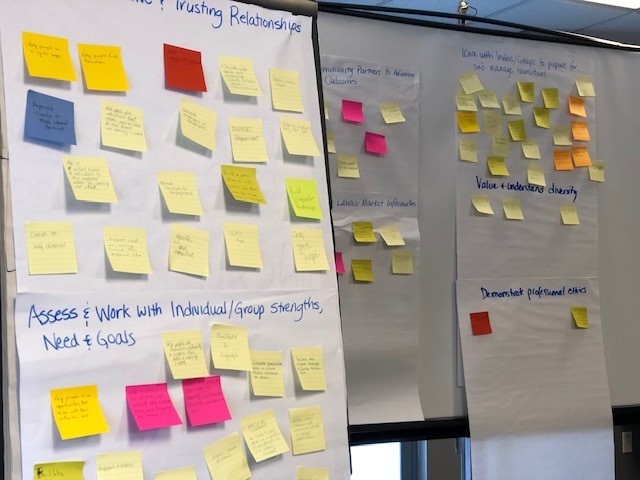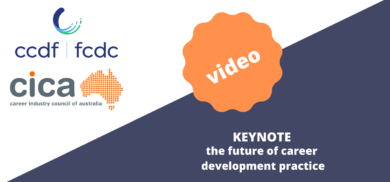Together, we can develop a strong evidence base.

CCDF believes that who you directly involve in the research has a lot to do with how well the findings are implemented into practice. CCDF’s research projects are conducted in partnership with front-line practitioners working with real clients and/or directly with people who are the subject of the research. Our research protocols have been consistently guided by the following principles:
- New interventions/programs/service delivery models must reflect front-line realities and practices or they will never be adopted into longer-term practice, regardless of results;
- Full engagement and buy in of research partners is essential. This includes front-line practitioners, their clients, their supervisors and management in career service settings. In education settings, this includes students and those that have left school prior to graduation, teachers, guidance counsellors, principals, government officials, employers, and community members. We are mindful in any research project to actively seek out and include under-represented voices;
- Involvement in a research project is a professional and organizational development opportunity that benefits clients, professionals, educators and management and supervisors.

Working with those on the front-lines results in outcomes that are grounded in reality and informs practice moving forward.
Our research

COVID-19 Recovery & The Canadian Career Development Sector: Impact and Recommendation for Professional Development
Key Researchers:
The COVID-19 pandemic tested people and systems to their breaking points. The career development sector was and continues to be a crucial collaborator through this recovery period. But what is needed to help those on the sector’s front lines respond effectively? The Canadian Career Development Foundation (2022) published a literature review that identified five socio-economic concerns that emerged from the COVID-19 pandemic and provided targeted recommendations for career development professionals (CDPs) to help them respond effectively.
Evidence for Community Employment Services: A Collaborative Regional Approach
Key Researchers:
This project set out to:
- Create the necessary systems to support evidence-based career/employment services and engender a culture of evaluation and accountability in which both policy and practice are actively informed and strengthened by data; and
- Build the confidence and capacity of the sector to be innovative in its development of services, strategic in its delivery and impactful with respect to priority client outcomes.
Phase 1 (June – November 2018)
Data mining and analysis of 10 years of reporting data (2008-2018) prior to the introduction of a new approach (PRIME); the collection of baseline practitioner data; the delivery of PRIME training and refinement of PRIME (new data collection and reporting tool)
Phase 2 (December 2018 – February 2020)
Integration of PRIME into service delivery; PRIME data collection and analysis; practitioner quantitative and qualitative data collection and analysis, including a comparative analysis with baseline data
Phase 3 (March 2020 – March 2021)
Reflection and learning from the data; targeted training and professional development; legacy resources, including the final report
Transitioning from Public School to Post-Secondary Education in the Atlantic Region: Issues, Challenges and Approaches to Support Success
Key Researchers:
This report extends Future in Focus by examining current strengths and gaps in the systems supporting public to post-secondary transitions. Based on existing Atlantic assets and opportunities and national/international best practice, clear and concrete recommendations to strengthen post-secondary uptake, retention and successful student transition beyond post-secondary to the labour market were articulated.
Addressing the Catch 22: RBC Career Launch Applicants Recommendations for Improving School-to-Work Transitions
Key Researchers:
CCDF was commissioned by RBC to conduct an analysis of applications to its Career Launch Program for the first three years of its operation. The research within the report is based on a random sample of approximately 5,800 applications submitted during the three years that the RBC Career Launch Program has been accepting new graduates into paid internship positions. The applications received from recent post-secondary graduates (24 years old or younger) provided data on applicants’ education, work and volunteer history and, in the essay portion of the application, their perspectives on what can be done to improve school-to-work transitions in Canada.
Improving the School-to-Work Transitions of Youth in Canada: A Scoping Review
Key Researchers:
The Canadian Career Development Foundation (CCDF) undertook this scoping review to examine how to support better school-to-work transitions for youth – those who had left school prior to graduation, who went directly to the labour market after high school graduation and those who had graduated from a PSE program. The main objectives of this project were to identify what is needed to improve school-to-work transitions of Canadian youth and identify research/programming/policy gaps for future project considerations.
Through this project, CCDF’s undertook four main methods of inquiry to build this scoping review:
The formation of a 12-member cross-sectoral Advisory Committee (AC) of key stakeholder representatives who advised both on the development of the project and provided input on the research, potential hypotheses, literature sources, and key informant contacts;
A literature scan of Canadian and international research related to school-to-work transitions (Literature Scan);
A survey of stakeholders (n=141) to identify the main factors contributing to poor school-to-work transitions of Canadian youth, promising practice and the identification of champions working to create bridges for better transitions for a range of youth (Survey Report); and
Interviews of 11 key informants that served as a final check on the findings from the other methods of inquiry listed above (Key Informant Interview Report).








